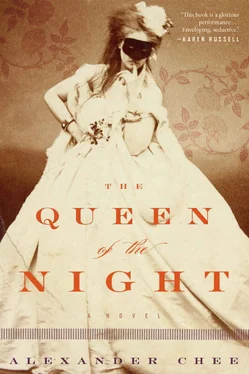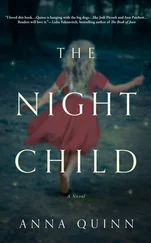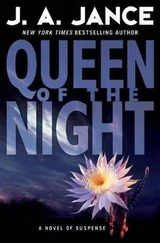I touched the window’s glass with my hand.
I could still feel those threads I was sure connected us, heavy in the growing night, hidden there. I could still feel their pull.
The nocturne I thought of as his began then, the music threading its way up from below in the salon. I recognized this with a shock and went out into the hall and halfway down the stairs before I saw, through the curving archway, Pauline, still at the piano, her slender neck pale in the dark.
Pauline who, as I could see, loved this nocturne, too — she played it with an absorption that my own listening sought to match even as I stood by the door full of fear.
What sign was this, amid my other signs and portents — was this a cruelty, as it seemed to me at first — mocking me and my fears — or a doom, my strange god’s way of saying there could be no bargain, or the opposite — a parley, even a mercy? A promise? I stayed in the doorway and listened, for there was nowhere to be until she was finished; and slowly, note by note, the tumult ended, the spell broke, and all thoughts of meanings, signs, and omens left until there remained only her and the goodness of her, a charm against these fears, and the nocturne.
And him. He was there, just for a moment, an apparition in the air before me as surely as if he’d stepped from a carriage in the drive. The sound of the remaining grape leaves rattling above us in the wind. His face silver in the moonlight, his finger as he touched my lips. And then gone.
How will I survive this? I asked myself. To come all this way had taken so much from me.
The pleasure of eavesdropping on a musician, Pauline said then, is in how there’s a performance possible sometimes when you believe no one is listening, one that should be offered to the world and yet may never be because it vanishes once the musician is aware of a listener.
She said this without raising her head. She had known I was there.
The sense of bravery and purpose I felt that night returned to me, and I met her gaze confidently as she closed the piano and stood to face me, smiling.
And yet this is what we must summon to ourselves as we play or sing. We must bring that out. Hello, my new friend, she said. Is everything well?
I nodded. Never better, I said. What is that you were playing just now? I asked.
A lovely form of music called a nocturne, she said. Named for the night. It seemed appropriate to play it just now as the night begins to fall. What did you think of it?
I thought so. It’s… I think it’s one of the finest pieces of music I’ve ever heard, I said.
You know it! I think so, too. It was written by a very good friend of mine, a composer by the name of Chopin. He was not at his best in concerts; it drove his fans to despair. You had to catch him unawares, she said, and waved her hand at me. A surprise audience but hidden, and so I have many fond memories of sitting outside a music room as he played alone. I think this is the best way one can listen to Chopin, as you did just now. We have guests arriving in an hour, will you be ready?
Yes, I said.
I noticed he brought you here without a maid but with all those trunks! My own is quite busy, I’m afraid, but I will find someone to assist you.
Thank you, I said, and returned to my room to wait, where I stood by the window, looking out into the dark garden again.
What luck, what luck it was that had put me here, a welcome guest in their celebrated company. And yet the one feeling stranger to me than being unable to rescue myself from an unlocked room was my growing sense, as I listened to her, that I did not want to be rescued — not from this. The menace I’d previously ascribed to her and whatever this school of hers would be was gone, and in its place was the feeling that I did not want to leave, perhaps ever. As Pauline returned to her careful vocalizes, and I heard the sure-footed power in her voice as it ran its paces, I recognized that her voice had some of the timbre and qualities of my own — a sense of recognition I’d not had previously. Before I’d had even a single lesson with her, I knew, now that I was here, I would do well not to leave her side, not until I was finished learning everything she could teach me. I’d never met a woman like Pauline and had met her at a time when I feared not one woman like her existed in all the world. In some way I had never known how to express, I’d feared I would have to become the first of my kind, whatever my kind was, should I be allowed to survive — that which history has never seen before. Instead, here Pauline lived; she had done what I feared I would have to do and now lived as the most liberated woman I’d ever met in a world she’d sung into existence with a voice much like my own. And whether or not she could teach me to sing with this strange voice of mine, I wanted to learn how to be like her as much as possible, and so I did not feel like a captive now. I felt saved. To leave would mean leaving this education undone.
Yes, I could stay until after tonight, or I could stay until the spring. Or I could stay until she was done with me. I knew already what I would choose.
For now, the price was the performance I was to take up again, waiting for me in the trunks by the dressing room; I had a few more moments before the tenor roused himself and it would begin again. I poured water into the washbasin at the table and began to gently wash my face with a cloth. The strange pity I’d felt earlier for the tenor returned — and while it was strange to think of him as the innocent in this, he was; and the more I did think of him this way, the more that pity began to change, though I was not yet aware of it or what it meant.
Pity, which, it should be said, is the ambassador of love. And it grows only from a position of power. And I did feel powerful, at last, as I sat, shook out my hair, and, with a fine new hairbrush found waiting among my parcels in that first trunk, began to brush my hair flat. I felt as powerful as if I’d already escaped into my heart’s desire.
One day I would leave him, and I would not explain. Whether I left with a summons to go at once to the Emperor’s side or because I’d earned my eventual freedom, either way I knew I would leave and he would never know, and he could never know, this was among the conditions. And if I did my best, he, in turn, would protect me and more. He would need to believe on waking what he believed as he slept there across the hall, and he would need to believe it constantly, so that he would never see the moment when it came. There should be no falseness to it , I told myself, as I prepared to put my hair back up.
What I did next, I would do every night after. Whenever you think of the one, think of the other , I told myself. This is how you will survive . And so I built a secret second heart inside my heart, a little theater full with my memories of my real love, such as they were — a gilded cage for him made of this music, the torch in the night, the music room in a palace. All of it would be hidden at the center of the other heart, the one I’d always had, now an alias as surely as the name I had given the world. There was a secret door, of course, hidden by a view of chestnut trees gold with autumn in the afternoon sun.
I recalled the two of them as they were that night at the ball when they performed together, when I watched, hidden, until the Princess Metternich scared me away. My true love and my false one. If I could see that memory each time I saw the tenor, I could smile as I ought to, touch his neck as I ought to; I would behave entirely like the lover he believed was here, and I would travel safely to my true love on the other side of these days before me.
Wherever the Empress still kept him, this was his home with me.
Читать дальше












